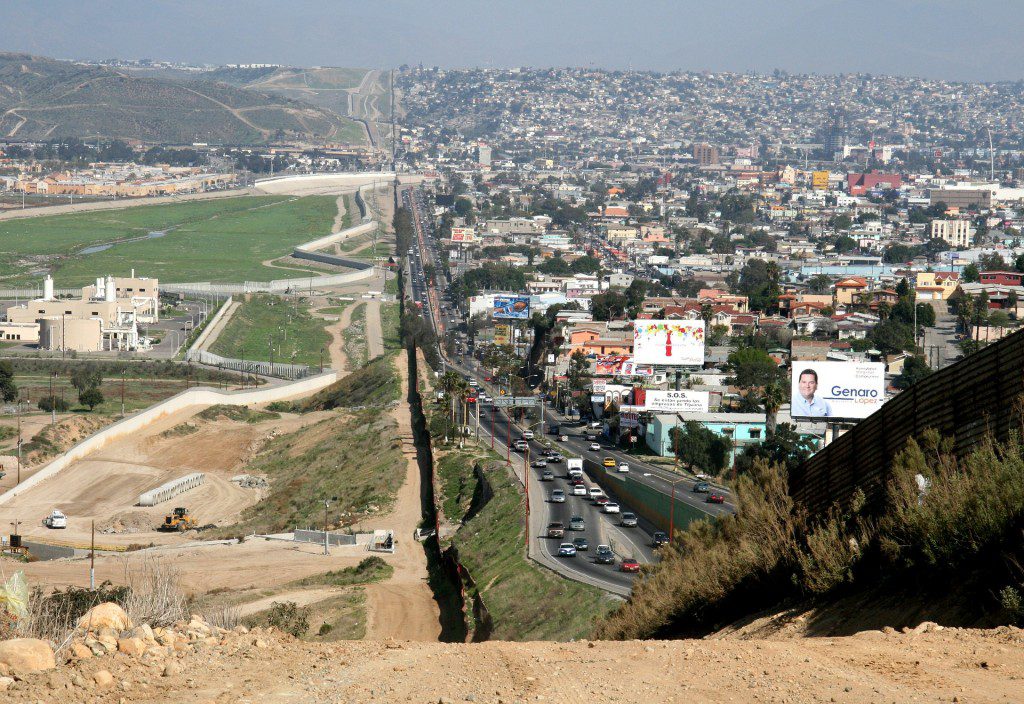
Here’s an Eric Zorn column from a couple days ago, partially reprinted in Sunday’s Trib: “Pelosi says border walls are ‘immoral.’ But that’s not the conversation we need to be having right now.” It’s a short piece and difficult to excerpt only a fraction, so this is a larger quote than I would generally use:
Better late than never, I am taking Democratic U.S. House Speaker Nancy Pelosi to task for confusing a fraught political issue by referring to a wall on our Mexican border as immoral.
On Dec. 6, she said that additional barrier construction as demanded by President Donald Trump would be “immoral still,” even if the Mexican government paid for it. On Jan. 3, then, responding to reporters’ questions about the partisan standoff over wall funding that has resulted in a shutdown of roughly 25 percent of the federal government, Pelosi said, “A wall is an immorality. It’s not who we are as a nation.”
She hasn’t elaborated, but it’s an interesting philosophical assertion. Now, though, it’s one best suited for late nights in the dorm room rather than the halls of Congress.
“Freedom of movement is a basic human right,” argued George Mason Universityeconomist Alex Tabarrock in an Atlantic essay in 2015. “What moral theory justifies using wire, wall, and weapon to prevent people from moving to opportunity? What moral theory justifies using tools of exclusion to prevent people from exercising their right to vote with their feet?”
and Zorn then recommends instead that Democrats focus on the harm caused by the shutdown, and closes with:
Better to talk about the immorality of deriding as criminals and thieves desperate families seeking safety.
But there’s also an approach that’s a sort of Open Borders Lite, which imagines that in the end, having a legal structure requiring immigration visas is fine, so long as you don’t enforce it too much, and so long as people still have the ability to acquire false IDs and cross borders illegally or overstay visas, because, in their minds, this lack of enforcement provides a means for people to access the American Dream even if they don’t qualify for immigration visas, and they likewise imagine that, because the path has been made more difficult, there is a certain nobility to those undertaking illegal residency, because they are fleeing injustice or want to provide a better life for their families. (Always “for their families” – even if it’s a single young man whose family consists only of hypothetical future children.) I have the impression their sense is that half-hearted immigration laws serve the purpose of weeding out those whose motives aren’t pure, however half-baked a notion that might be.
When Democrats such as Nancy Pelosi say that they believe a wall is “immoral,” they may come up with all manner of reasons: “it’s immoral to spend this money that we could otherwise be spending on other needs” or “it’s immoral to seize land by eminent domain” but none of these reasons strike me as in the least believable. Since when have Democrats cared about spending, or about eminent domain? They speak as if the mere idea of a barrier between nations is grossly wrong, when in fact large portions of the US/Mexico border are already fenced (see this NPR graphic and NPR report), and describe approvingly a past history in which Mexicans did cross the border for work without restrictions. None of it makes any sense to me. The only explanation for labelling as immoral a barrier that prevents border-crossing or restricts it to those with valid visas, is a conviction that it is morally wrong for the United States to prevent the entry of those who are so deserving of it, because of their poverty or other hardships, that they are willing to cross at their own peril and accept the second-class-ness of working with false IDs or under the table. Likewise, we’d need to worry about border enforcement less if we had stronger laws against working with forged IDs or under the table, but Democrats speak of these as an injustice as well.
Hence, Zorn’s statement that it’s wrong to criticize “desperate families seeking safety” – which fits in with the repeated characterizations of border-crossers from Central America as motivated by poverty and violence, with their supporters either pairing those two motivations or else openly treating poverty as so extreme that it warrants keeping access to the United States for these people, no matter how many reports one reads that the majority of those in the caravans, for example, are, as with many border-crossers before them, simply seeking to make their fortune, and that the families crossing in the desert have done so at a cost of as much as $10,000 or more, as an investment which they hope to make back, rather than as desperate hope for refuge. (See this Washington Post article describing the view in Guatemalan villages that the route to residency in the United States is to bring a child along.)
So here’s the second question of my title: does it matter?
Are de facto open borders supporters reliable negotiating partners, when they say that they’ll exchange border security and internal enforcement for amnesty? Or does their belief that there’s something wrong with completely preventing illegal immigration mean they can’t be trusted?
There are superficial similarities to abortion rights supporters saying of anti-abortion activists who propose legislation such as “fetal pain-capable” abortion bans or waiting period laws or requirements that abortion doctors have admitting privileges, cannot be trusted because their ultimate goal is to ban all abortion. But in this instance, pro-life sponsors of such legislation are asking squishy pro-choicers to vote for their bills based on the legislation itself. Limiting abortion to 20 weeks, for example, does not in itself affect the status of first trimester abortion. Anti-abortion activists or legislators are not offering a Grand Bargain — the better equivalent would be if they promised that, in exchange for an abortion ban with immediate effect, they would cast their votes for maternity leave, increases in welfare benefits, and government-paid child care at some vague point in the future — and you better believe we’d be hearing things like, “how can we trust the anti-abortion legislators to keep their end of the bargain when we know they really don’t believe in these things?”
So yes, I have questions.










